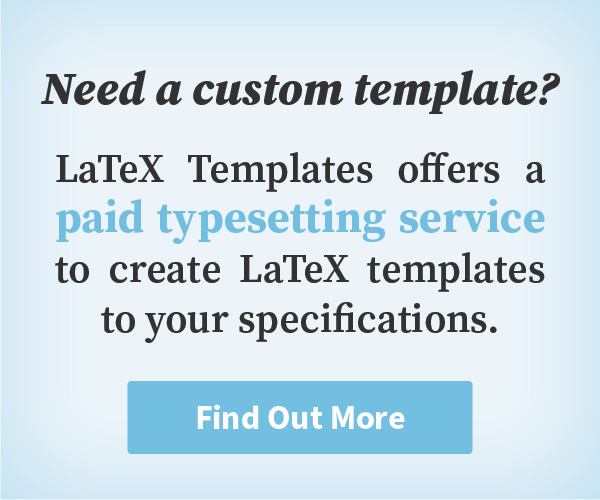Description
This template is for conference organisers who wish to produce a booklet or online document for attendees detailing conference information and presenters. The template is primarily aimed at academic conferences but can be tailored to commercial conferences.
The template is structured to initially display a cover page (from image) then the main conference information. A daily timetable follows and breaks down each day into conference events, breaks and talks. Four talk types are available and special ones are highlighted in the timetable. A full list of abstracts follows and displays information about each talk including authors, affiliations and examples of including references. Posters can be output in the same style of abstracts, or alternatively as a compact list with just titles, authors and affiliations. A list of participants is available and can be used to list all attendees of the conference as a quick reference. Finally, housekeeping information and sponsors are listed at the end.
Preview
Authorship
This template was created by Maxime Lucas and Pau Clusella, with extensive modifications for this website by Vel.
Current Version
v1.0 (December 22, 2019)
License
This template is licensed under a GNU General Public License (v3) license.
Usage Guide
The conferencebooklet Class
The conferencebooklet class supplied with the template defines the structure and layout of the template. If you would like to make changes to the template, it is recommended to find the relevant code in the class and redefine it in the template. For example, if you would like to change the colours, you would navigate to the COLOURS block in the class and find that the colour you are interested in changing is called myblue. You would then copy the definition from the class into the template and change the RGB values to suit your liking without modifying the class.
Compilation
This template should be compiled with standard pdflatex.
Custom Commands
The template largely uses standard LaTeX commands and environments for creating the layout of the booklet. This section explains a few custom commands that are used to make entering booklet content simpler.
Timetable
The timetable for each day is housed in a table that can be split across pages. The rows within the table are created using custom commands to simplify adding entries for each day.
The \tablebreak command is for conference breaks or conference administration and takes 2 arguments. The first is for the time of the break and the second is for the description.
The \eventtype command is used for conference events, such as the poster session and conference dinner. This command takes 2 arguments, one for the time of the event and the second for the description.
The \KL, \IS, \CT and \IT commands are used for keynote lectures, invited speakers, contributed talks and invited talks, respectively. Each command takes 4 arguments: 1) the time of the talk 2) the speaker 3) the speaker’s institute or country 4) the title of the talk.
Abstracts
Each abstract is created using the \abstract command. This command takes 5 arguments: 1) the title of the abstract 2) one or more authors associated with the abstract 3) whether the abstract needs to be tagged as a keynote lecture (\KLTag), invited speaker (\IStag), contributed talk (\CTtag) or invited talk (\ITtag) 4) the affiliations of the author(s) 5) the abstract text. The template includes examples of how to include references within the abstract text argument and a handy blank template for new abstracts at the top of the abstracts block.
Poster Abstracts (compact)
Poster abstracts are typically produced using the same \abstract command detailed above, but some conferences may wish to produce a compact list of posters instead. For this purpose, the \poster command is available. The command takes 3 arguments: 1) poster title 2) poster author(s) 3) author affiliation(s).
Download Template
Have a Question?
Report Bug
This page last updated on: December 22, 2019
